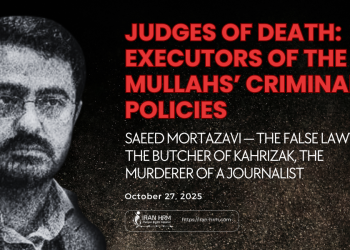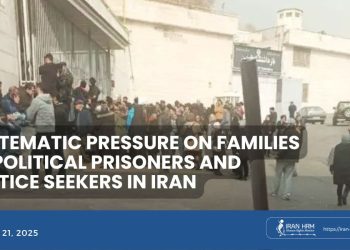Special Report: Death Prisons — Part 1
Is Iran on the brink of a silent human catastrophe?
A chain of covert operations, systematic repression, silent abductions, and open threats by security and judicial officials indicates that more than isolated human rights violations are occurring. The recent rapid events — from the abduction and transfer of political prisoners to unknown locations to psychological torture and death threats reveal that the machinery of repression has launched a new phase of physical elimination.
Behind closed doors, beyond media scrutiny, under tight security surveillance, and within the walls of prisons like Evin, Qezel Hesar, Fashafouyeh, and Qarchak, the regime is laying the groundwork for another wave of mass elimination. The strategy echoes the horrors of the 1988 massacre; this time, under tighter media control and deeper silence.
If the world remains silent again, what will be repeated is not only a crime but complicity in its commission.
The Return of Execution in Silence: Echoes of 1988
In recent months, hundreds of political, ideological, and ethnic minority prisoners have been transferred to prisons such as Fashafouyeh and Qarchak. Many have been denied phone calls, access to lawyers, medical treatment, and even basic information about their whereabouts. This mirrors the exact pattern of enforced disappearance and covert transfers that led to the 1988 massacre of thousands of prisoners.
The abduction of Ali Younesi before the recent war began shows clearly that the regime’s claim of “protecting inmates during wartime” is a mere pretext. Saeed Masouri, a political prisoner for 25 years, explicitly warned:
“There is a real risk that the same path is being follow; only with new words and methods.”
Informal Command Structures and the “License to Kill”
While the 1988 “Death Committee” was made up of judiciary and intelligence officials, today the regime has delegated such decisions to unofficial bodies under the slogan “License to Act Freely” (Atash be Ekhtiyar), rendering the structure of physical elimination even more opaque.
Statements by hardline clerics and officials reveal a chilling truth: the regime takes pride in the 1988 killings and is openly justifying similar actions today.
- Hossein Taeb, current advisor to Khamenei, declared:
“Had we not acted in 1988, the revolution would’ve been destroyed. We must also act decisively against today’s seditionists.”
- Ahmad Khatami, Tehran’s Friday prayer leader, insisted:
“Divine justice must be executed against rioters.”
In an official report, Fars News Agency defended the executions of protesters:
“We must not refrain from implementing divine punishment against those whose hands are stained with innocent blood. Just as we acted decisively in 1988, we must show no mercy today.”
Hosseini Hamedani declared on state TV:
“Today’s conditions closely resemble the 1980s; especially 1988.”
These statements confirm that the regime’s official discourse is paving the way for a renewed logic of state led crime.
A Chain of Events – Preparation for Atrocity
The Abduction of Ali Younesi
Younesi’s disappearance occurred days before the war began, completely unrelated to any alleged “security concerns.” This exposes the regime’s justification — that the transfers are for prisoner safety; as a blatant lie.
Ali Younesi, a top student and political prisoner, was abducted from Ward 4 of Evin Prison on June 17, 2025. The operation was violent and carried out without informing his lawyer or family. His whereabouts remain unknown.
Simultaneously, his elderly father Mir Youssef Younesi, himself a former political prisoner, was also transferred to an unknown location without explanation. Authorities have provided no accountability or communication.
This case is a textbook example of enforced disappearance under international law; a grave crime under the International Convention for the Protection of All Persons from Enforced Disappearance.
Bijan Kazemi and the Safe Houses: Legal Murder in the Shadows
In late June 2025, Bijan Kazemi, a protester and former member of a justiceکseeking family, was arrested in front of his home in Tehran and taken to a safe house in Qom. He was reportedly beaten severely. Images of his bruised face and signs of torture were later shared online.
Days later, security forces raided his elderly mother’s home in Zanjan and transferred her to Qom as well. The family had no information on his condition or location during his detention.
The use of “safe houses” outside any judicial oversight, with no legal access to counsel, is not only illegal detention but violates Article 9 of the ICCPR (International Covenant on Civil and Political Rights).
Enforced Disappearances – A Systematic Pattern
Other cases in recent weeks show a clear, organized trend. Political prisoners, Kurdish and Arab inmates, and civil activists; have been forcibly transferred without notice from Evin, Qezel Hesar, and Rajaei Shahr prisons.
Blocked phone access, refusal to confirm prisoner status, and intimidation of families all mark a broader shift from individual violations to systematic suppression. Under such conditions, the risk of torture, forced confessions, and secret executions grows alarmingly.
Wave of Executions: Physical Elimination Under Silence
Alongside the disappearances, multiple verified reports indicate a new surge in death sentences and executions; particularly against political prisoners in Kurdistan, Khuzestan, and Tehran.
Dozens have been sentenced to death on vague charges such as “collaboration with the enemy” or “corruption on earth.” Security agencies attempt to justify these actions with fabricated narratives, while the legal proceedings lack all transparency and legitimacy.
Many have been moved to solitary confinement in preparation for imminent executions, with families warned not to speak publicly; under threat of retaliation.
This shows that disappearance is only the first step; the regime’s ultimate goal is physical elimination. International silence only fuels the machinery of death.
Legal Analysis
The above actions represent violations of multiple binding international norms:
- Article 9, ICCPR – Arbitrary detention
- Article 7, ICCPR – Torture and inhuman treatment
- Denial of due process and access to legal counsel
- Convention Against Enforced Disappearances
Such actions, especially when widespread and systematic, constitute crimes against humanity under international law.
Preliminary Conclusion
This is only the beginning of a catastrophe whose full scope is yet to emerge. If the international community delays again, the ruling regime will succeed in its project of physical elimination; this time under total silence.
In the next part: we will address the aftermath of the Evin Prison bombing, the abduction of Saeed Masouri, prison hunger strikes, and the humiliation of political prisoners’ families.
To be continued…







